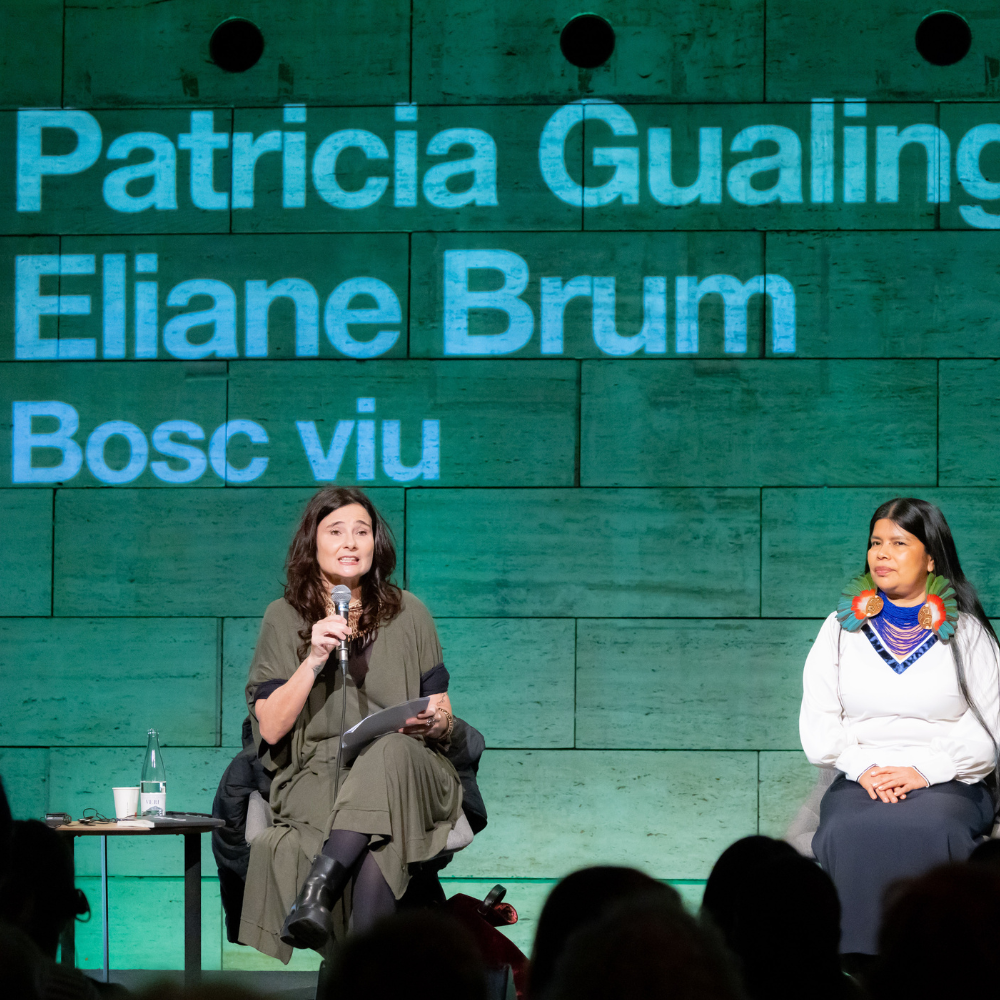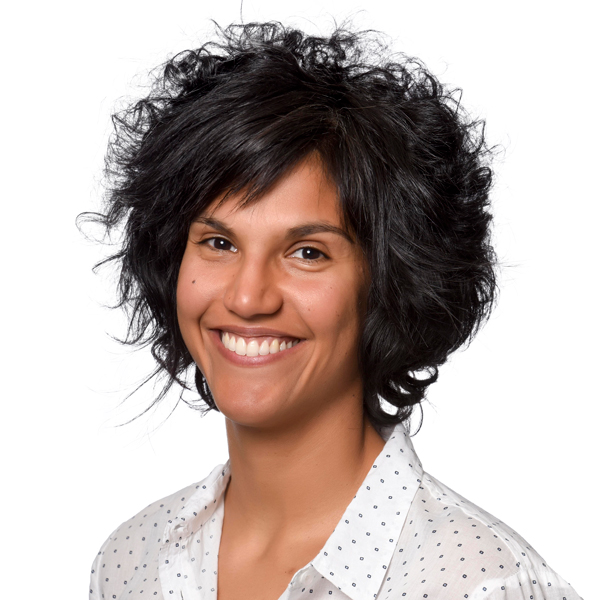Thinkers and creators from the Global South
Discover contributions from prominent figures around the world who question dominant narratives, offering different perspectives and proposing new ways of understanding contemporary life. This is a selection of content from one of the main themes of the CCCB Resident international residency programme, organized in collaboration with the UOC.

CCCB Residency programme

The programme is run by the Centre de Cultura Contemporània de Barcelona (CCCB) and invites thinkers, journalists and creative artists to spend three months in Barcelona and engage with the city's cultural and academic life. During their stay, the residents participate in various public activities, curate projects at the CCCB and create ties with cultural agents.
Seeking to foster high-quality debates and the creative relationship between Catalonia and the world, the project works in two areas:
- Journalism and truth
- Thinkers and creators from the Global South
This project is supported by the Mir-Puig Foundation in collaboration with the Universitat Oberta de Catalunya (UOC).
What is the Thought of the Global South?
The thought of the Global South is a critical tradition that challenges the parameters and canons of modern Western thought, questioning its claim to universality and its role in the subordination of other forms of knowledge. It is a diverse field of thought, which contains various traditions and disciplines.
Achille Mbembe examines how Western thought has constructed the idea of the "black race" to justify slavery, colonialism and racism. He explores how this logic persists today, affecting global relations, economics and identity, while providing an in-depth philosophical and historical critique.
A critique of Western feminism, which often simplifies and victimizes women in the Global South. The author Chandra Talpade calls for a critical and transformative global feminism that is capable of challenging the structures that perpetuate oppression and inequality.
Edward W. Said looks at how the West has constructed a stereotyped and inferiorized image of "the East" to justify colonial and cultural domination. The author shows how this representation, which is present in literature and academia, consolidates relations of power and inequality between the West and the East.
Prado-Fonts, Carles. "Orientalism: thirty years on. Introduction." Digithum: a relational perspective on culture and society, (10), (2008): 1-6. https://hdl.handle.net/10609/102866
Frantz Fanon provides a radical analysis of colonialism and its psychological and material effects on colonized peoples. His book calls for the struggle against colonialism as a means of disalienation and emancipation, and denounces the structural violence of the colonial system.
Gayatri Chakravorty Spivak questions whether the voices of subalterns, and women in the Global South in particular, can truly be heard within Western discursive frameworks. She condemns academia's frequent reproduction of structures which silence voices and create unequal representation.
The author Martha Palacio examines the tensions and links between postcolonial thought and feminist theories, while questioning the universalization of women's experiences from a Western perspective. The book advocates a decolonial feminism that recognizes women's cultural, historical and political differences in postcolonial contexts.
Paloma Sierra Ruiz presents a twofold critique – epistemological and political – of hegemonic modernity, eschewing elitist academic categories and adopting anti-colonial and anti-patriarchal positions, while integrating a ch'ixi epistemology as a transformative tool.
A perspective from Ngũgĩ wa Thiong'o which condemns the symbolic control exercised by Eurocentric language and narratives, and calls for a diversification of the cultural centre. He calls on us to reposition multiple epistemic centres, recognizing minority languages and cultures in order to decolonize the mind and the imaginary.
Aimé Césaire's speech to the French parliament denouncing the dehumanizing effects of colonialism and demanding recognition for the dignity and culture of colonized peoples.
Aimé Césaire's radical critique of European colonialism, highlighting how it destroys cultures, dehumanizes peoples, and morally corrupts Europe. The work denounces the false superiority of Western civilization, and shows that colonialism, racism and fascism are parts of the same oppressive system.
A political documentary marking a revolution in the history of Latin American cinema from Trigon-film. It examines neocolonialism, violence and decolonization struggles in Argentina and Latin America. It uses shocking images, voice-over commentary and political quotes to denounce imperialist oppression, racism, the dominant culture and the repression of the working classes.
A book by Boaventura de Sousa Santos that highlights the need to acknowledge and restore the knowledge silenced by colonialism and Eurocentrism. It calls for an "ecology of knowledge" to foster epistemic justice. It criticizes the Western monopoly on knowledge, and argues that perspectives from the Global South are essential for transforming the world with greater equity and plurality.
Residents
The programme participants invite us to reflect on the creation of decolonial imaginaries, the climate crisis and the preservation of the Amazon, and the promotion of linguistic diversity, among other issues.
Eliane Brum
The CCCB's bio of resident Eliane Brum.
Eliane Brum's BlueSky account, where she posts regularly.
A conversation between Eliane Brum and Hug March (UOC) that examines the Amazon's vital importance for the planet's survival. They reflect on its symbolic role, the consequences of its exploitation by the Global North, and propose alternative eco-social futures.
A platform for journalism which seeks to recentralize global narratives from the rainforest, amplifying the voices of its indigenous peoples. It uses reports, podcasts and training programmes to promote ethical and independent journalism with an intercultural and intergenerational approach.
AMAZONIA | Eliane Brum: "Intento hacer reportajes 'entrevistando' a otras especies" | EL PAÍS
Presentation of the book La Amazonia: viaje al centro del mundo, in which she examines issues of race, class, gender and the environment in the Amazon. She highlights five works of literature which have had a major influence on her committed critical perspective.

Txai Suruí, an indigenous activist, talks with Eliane Brum about young people's struggles against the climate crisis in Brazil, and indigenous communities' resistance to extractivism and deforestation. She highlights the bodies and territories that sustain life and delay the devastation of the planet.
A journalistic and personal report on the ecological and social destruction of the Amazon. The author denounces the impact of extractivism and calls for alternative visions focused on local life and knowledge.
Tsitsi Dangarembga
The CCCB's bio of resident Tsitsi Dangarembga.
UOC faculty member Maria Iñigo interviews Tsitsi Dangarembga. The interviewee explains how her work curating a film festival in Zimbabwe has enabled her to detect gaps in cinematographic production, particularly in films directed by African women. She reflects on the influence of the Global North perspective and criticizes the predominance of 'development cinema', focusing on characters who personify social problems. The interview also explores Dangarembga's book Black and Female, which explores matters such as trauma and emptiness.
A non-profit organization working to promote a sustainable creative economy in Africa through innovative artistic production and arts training. The project includes initiatives that foster the inclusion of women in the African film industry and the creation of transformative social narratives.
An autobiographical essay exploring the identity of African women in postcolonial contexts. It reflects on trauma, decolonization and resistance through writing, calling for a voice for women in the face of the power structures that perpetuate oppression.
A novel that relates the life of a young Zimbabwean peasant woman who struggles to gain access to education in a society defined by colonialism and patriarchy. The author adopts a critical perspective to explore the tensions between tradition and modernization, Africanism and Europeanism, and the search for personal and collective independence. The novel is an in-depth reflection on postcolonial conditions and the role of women in society.
Interview with Tsitsi Dangarembga
An interview with the Zimbabwean novelist in which she denounces the silences imposed by colonialism and patriarchy through literature, cinema and social mobilization. Her novel Nervous conditions is crucial for understanding contemporary feminist and decolonial struggles, and has established her as a leading voice in global feminism and decolonization.

A reflection on how writing can break down the silences imposed by colonialism and patriarchy. Through literature, she denounces historical wounds and calls for healing through one's own voice and creative resistance.
An article in which Dangarembga reflects on her literary career, the difficulties in achieving recognition as an artist in Zimbabwe, and the tensions between feminism and intergenerational and interracial dynamics. She also discusses decolonization, the responsibility of the winners in historical processes, and the need to construct affirmative narratives for African women.
A documentary that explores the challenges related to conserving elephants faced by African communities who live near national parks. The film highlights the tensions between wildlife preservation and the needs of local communities, with an emphasis on programmes such as CAMPFIRE that seek to balance those interests. The strategies the communities adopt to live side-by-side with the animals and the economic and social implications of this coexistence are examined in direct testimonies.
A documentary exploring the complexities of land reform in Zimbabwe. It uses various perspectives to examine the tensions arising from land invasions, revealing a more nuanced situation than the standard simplistic news reports. It offers a critical and in-depth view of the country's political and social dynamics related to land ownership.
Yásnaya Elena Aguilar Gil
The CCCB's bio of resident Yásnaya Elena Aguilar Gil.
Yásnaya Elena Aguilar Gil's Instagram account, where she posts regularly.
An interdisciplinary network of young Mixe activists working to revitalize Mixe language and culture in Oaxaca, Mexico. It promotes language education and defence of the territory, while also addressing issues of identity, history and territorial rights. The project includes the creation of books and resources in the Mixe language, as well as the documentation and transmission of oral narratives and ancestral knowledge.
A collective work which contains texts by various authors reflecting on the importance of linguistic diversity in a globalized world. The topics addressed include the preservation of endangered languages, the relationship between language and cultural identity, and the need to promote inclusive language policies. The collection highlights language as a crucial tool for social cohesion and cultural resistance.
A podcast that reflects on the importance of language as a cornerstone of cultural identity and resistance. Based on her experience as an activist and linguist, she highlights the need to revitalize indigenous languages to strengthen communities and preserve ancestral knowledge.
An article appearing within the Feminist Artificial Intelligence initiative, exploring how language shapes our perception of the world and our relationship with technology. It emphasizes the need for AI that includes linguistic and cultural diversities, and fosters a more inclusive and equitable vision. This perspective challenges the prevailing technological attitudes, and calls for a new approach that acknowledges plurality as a key factor in the construction of knowledge and technology.
A study of the importance of voice and identity in contexts of colonization and oppression. The author uses personal and narrative reflections to examine how the word can be a tool for resistance and healing. The article contributes to discussions about decolonization, feminism and the search for a personal voice in a world defined by inequalities.
A collection of theoretical texts by Latin American and Caribbean women thinkers in which the authors present methodological and epistemological innovations that enrich the global debate in social sciences, the humanities, literature, translation and political philosophy.
Librarians responsible for this library guide

Bárbara Badell
Operative subgroup: Librarian for Arts and Humanities, vocational training Operative group: Library for Learning


